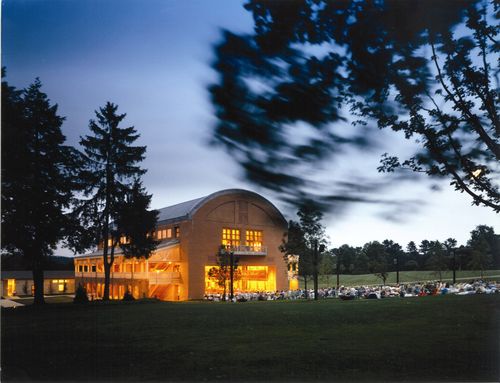
Ozawa Hall at Dusk (Photo Credit: Steve Rosenthal)
Over the weekend I took my family to Tanglewood, the famous camp-like summer retreat of the Boston Symphony Orchestra in Lenox, Massachusetts. The occasion was Tanglewood's annual "Family Concert."
I grew up attending children's concerts at Lincoln Center, where the New York Philharmonic has been giving some version of their Young People's Concerts since 1922. Although I was too young to catch Leonard Bernstein there in his most famous role, some years later I watched the entire run of his wonderful televised series on DVD and had the pleasure of writing about it for National Review. Bernstein's great command of his Young People's Concerts leaves little doubt as to how he managed to captivate a television audience of 20 million--let alone the kids in Carnegie and Philharmonic Hall. His program ran for 14 seasons, from 1958 to 1972, and was broadcast in nearly 30 countries. The Kultur DVD reissue of the series is one of the best educational purchases you can make, by the way, for both children and adults.
Family concerts are not only crucial to the future of classical music. They also play a foundational role in culture itself. They are the moments when young people recognize that great music is not a thing of history but one that lives in the present moment. It belongs to them, and can move them just as powerfully as it moved audiences in the past and will move audiences to come.
Yet this connection is far from guaranteed, so for such concerts the stakes are high. Adults can wave off a poor performance. Children are far more impressionable, and a bad concert can leave a taste that lingers. Which is why, I fear, Tanglewood's dreadful family concert over the weekend may have just taught a new generation to hate classical music.
Performed in Ozawa Hall and (thankfully) only $10 per adult ticket, the afternoon concert provided a perfect opportunity to picnic at Tanglewood and enjoy the historic grounds, but things went bad as soon as the concert began.
The big problem should have been apparent to anyone at the Boston Symphony Orchestra with oversight of the program: A unamplified wind and brass quintet is unable to fill a soaring 1200-seat open-air auditorium. This is probably true no matter who is in attendance, but it is certainly the case when you are playing to a hall of restless children.
The quintet's lackluster stage presense did not help. When not performing, the horn player, Rachel Childers, acted as emcee, but she was all talk, rattling on in a loud and goofy but entirely disconnected way--raising the ambient noise level in the hall before sitting down to resume the low-wattage musical performance.
The concert's opening rendition of Rimsky-Korsakov's "Flight of the Bumblebee" went okay, what I could hear of it anyway, but the additional pieces were entirely lost on me. Half-way through, Childers introduced a "bonus track," which, after much ear-straining, I learned was Luciano Berio's "Opus Number Zoo." The piece involves orchestra members reciting lines between the notes. After Childers surveyed her unamplified performers, she said something like, "hope this works." Well, it didn't work, and, unless your thing is experimental theater, looking at someone on stage speaking inaudibly is a sure-fire way to lose interest.
The Tanglewood Family Concert is supposedly a special event. The concert the BSO put on would have been, at best, appropriate for a classroom performance. The takeaway, I had to explain to my daughter after we walked out on the finale, is not that classical music is always great. The lesson is that sometimes, even if I recommend something, it could still be really boring.
Why BSO and Tanglewood couldn't do much better this past weekend is a question that should go up and down the hierarchy of the organization. I'd recommend they start by watching Bernstein.